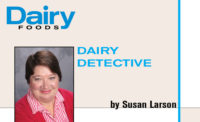A growing consumer interest in high-protein diets has led to a significant increase in the development of new dairy ingredients in the United States, as well as the development of new food products on a global scale.
For example, we’ve seen strong growth in Greek yogurt, protein drinks and protein in breakfast foods due to research that shows dairy proteins support muscle recovery, weight management and satiety. In addition, the demand for high-protein, low-lactose beverages and foods has been increasing rapidly in recent years.
High-protein milk protein concentrate (MPC), milk protein isolate (MPI), microfiltered milk protein concentrate (MMPC) and micellar casein concentrate (MCC) are comparatively new additions to the wide variety of milk protein ingredients being produced in the United States. Depending on the food category in which they are used, these ingredients can serve as emulsifiers, flavor enhancers, flavoring agents, formulation aids, humectants, stabilizers and thickeners, texturizers and sources of high-quality protein.
Concentrated milk proteins are complete proteins and contain either both casein and whey or casein proteins from milk. Just like milk, concentrated milk proteins contribute valuable minerals like calcium, magnesium and phosphorus to formulations, without increasing sugars (lactose), making them ideal for high-protein formulations.
The U.S. dairy industry works side-by-side with food and beverage manufacturers throughout the research and development process to help them successfully deliver innovative foods and beverages to the market. Following is some background on how these new ingredients are made and how the industry is using them.
Composition and production
In general, MPC and nonfat dry milk (NFDM) powders are similar products. The main difference is that MPC protein is concentrated using membrane filtration technology called ultrafiltration, which removes lactose. MPCs range in protein content from 42% to 85%. Common MPC products are MPC 42, MPC 70, MPC 80, MPC 85 and MPI (which typically contains 90% or more protein by weight).
MCC is produced by using membrane filtration technology using microfiltration where lactose and whey proteins are filtered out from milk, leaving behind caseins concentrate. Common MCC products include MCC 80 and MCC 90 but can also be produced as MCC 42, MCC 70, and MCC 85, labeled to reflect protein content. MCC has flavor advantages over the production of casein and caseinates, because it uses a simple filtration step and has some unique functional properties, for example forming reversible gels very similar to Jell-O (liquid when heated but solid when cool).
U.S. ingredient processors have become increasingly specialized as domestic MPC production has more than doubled in the past eight years due to overarching demand. Concentrated milk proteins are generally manufactured by filtration processes (microfiltration, ultrafiltration and diafiltration) followed by spray-drying. U.S. ingredient processors are using the newest separation technologies to deliver protein ingredients that meet specific functional and nutritional needs not possible with other standard milk powders in food formulations.
How to formulate with MPC products
The applications of MPCs in different products can vary depending on the protein content. Typically, lower-protein MPCs (42% to 50% protein content) are used as ingredients in cheese, yogurt and soup applications. Applications for higher-protein MPCs (70% and greater protein content) are beverages, medical foods, enteral foods and protein bars. Other common applications of MPC include desserts, baked goods, toppings, low-fat spreads, dairy-based dry mixes, dairy-based beverages and texture improvement for yogurt.
MPCs with higher-protein content can be used to enhance the protein content of foods and beverages by imparting a clean dairy flavor without adding significant levels of lactose, which may cause browning. Therefore, these high-protein MPCs are finding application in low-lactose, high-protein products such as cheese sauces and ultra-high-temperature beverages.
Potential commercial applications of MCC are ingredients for shelf-stable beverages and smoothies, protein fortification of dairy foods, ingredients for bakery, meat products and nutritional bars. MCC is available commercially, but is relatively new to the dairy ingredient world. Application work is still underway.
The U.S. Dairy Export Council has developed a series of prototypes that feature concentrated milk proteins. In the Lentil Power Soup formulation, MPC and MCC help deliver 20 grams of protein (40% Daily Value) and 35% Daily Value of calcium per serving. In the Chai Tea Latte formulation, MPCs provide opacity and a pleasant milky flavor profile, as well as a range of additional benefits. Visit InnovateWithDairy.com for more information on dairy proteins.




